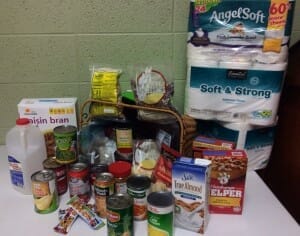Perhaps you’ve seen this quote by Theresa of Avila:
A group of concerned citizens in Roseville, Illinois, not connected with any church or civic organization decided in April 2011 that they would serve as the hands of Jesus. Helping hands, to be exact. They proved you don’t have to be big, have a lot of resources, or be part of an established organization to have afar reaching impact.
The group rented two rooms and a refrigerator at the former elementary school and set to work. On the first day of operation, the Health Department put a kink in the works. They had to have an air conditioner, they told co-founder Sandy Campbell. She went on to her job at her beauty salon, intending to call an area appliance store later in the day. Meanwhile, someone walked into the shop and put an envelope on Sandy’s desk. Grabbing a spare moment, Sandy ordered the air conditioner. The bill would be $499. Hanging up the phone, Sandy opened the envelope. Inside was a check for $500. Already, God was blessing the work of their hands.
 The work grew from there. Soon, the ministry was able to procure food from two area food banks. Local grocery store provided discounts on items like milk, meat, and baked goods. Local churches and residents donated money, items they couldn’t get otherwise, and lots of volunteer hours.
The work grew from there. Soon, the ministry was able to procure food from two area food banks. Local grocery store provided discounts on items like milk, meat, and baked goods. Local churches and residents donated money, items they couldn’t get otherwise, and lots of volunteer hours.
“Food stamps don’t cover paper products, cleaning supplies, or health and beauty aids,” Linda Jones, current president of Helping Hands told me. “We can always use more of those items.”
Linda told of one family so limited in what they had, one child expressed gratitude for the toilet paper they received. He was tired of Grandma telling him he could only use two squares.
Helping Hands now serves 450 families in Warren County, Illinois. That’s over 1400 people in a largely rural area. Most of the families need temporary help because of medical bills, insurance premium increases or loss of a job. Others, in spite of income too high for government aid, still can’t make ends meet. One couple who came to the food pantry had just retired. Then their landlord hiked their rent.
“It takes a lot of courage to walk into a food pantry,” Sandy said.
She told of one woman who had worked all her adult life. The woman had been off work for eight weeks due to a knee replacement surgery and had just been told she couldn’t return for another eight weeks. Driving to the food pantry, she parked then sat in her car and cried. She walked in and told the workers, “I’m so sorry I’m here.” The volunteers listened to her story, helped her select groceries, and carried them to her car. She cried again, this time with gratitude.
“That’s why we’re here,” Sandy concluded.
Clients are overwhelmed and grateful for what they receive. Often, as they select their food, they will pass up items, telling volunteers, ‘I have plenty of that at home. Save it for someone else.’” Many, once they get back on their feet financially, will return to donate items and volunteer hours.
The forms recipients complete when they first arrive have a blank titled, “How can we pray for you?” One women mentioned she needed a job. The workers had just heard the day care that shares the community building needed a cook. The woman was hired immediately.
Mostly, the volunteers at Helping Hands just try to show they care. Sandy’s conclusion could well be their mission statement.
“We try to help meet physical needs so people can concentrate on their emotional and spiritual needs.”


Hello, I would like to donate cans for community service. When would be a. Good time to do so? Thank you!
Contact your local community food bank to find out their guidelines and hours for donations.